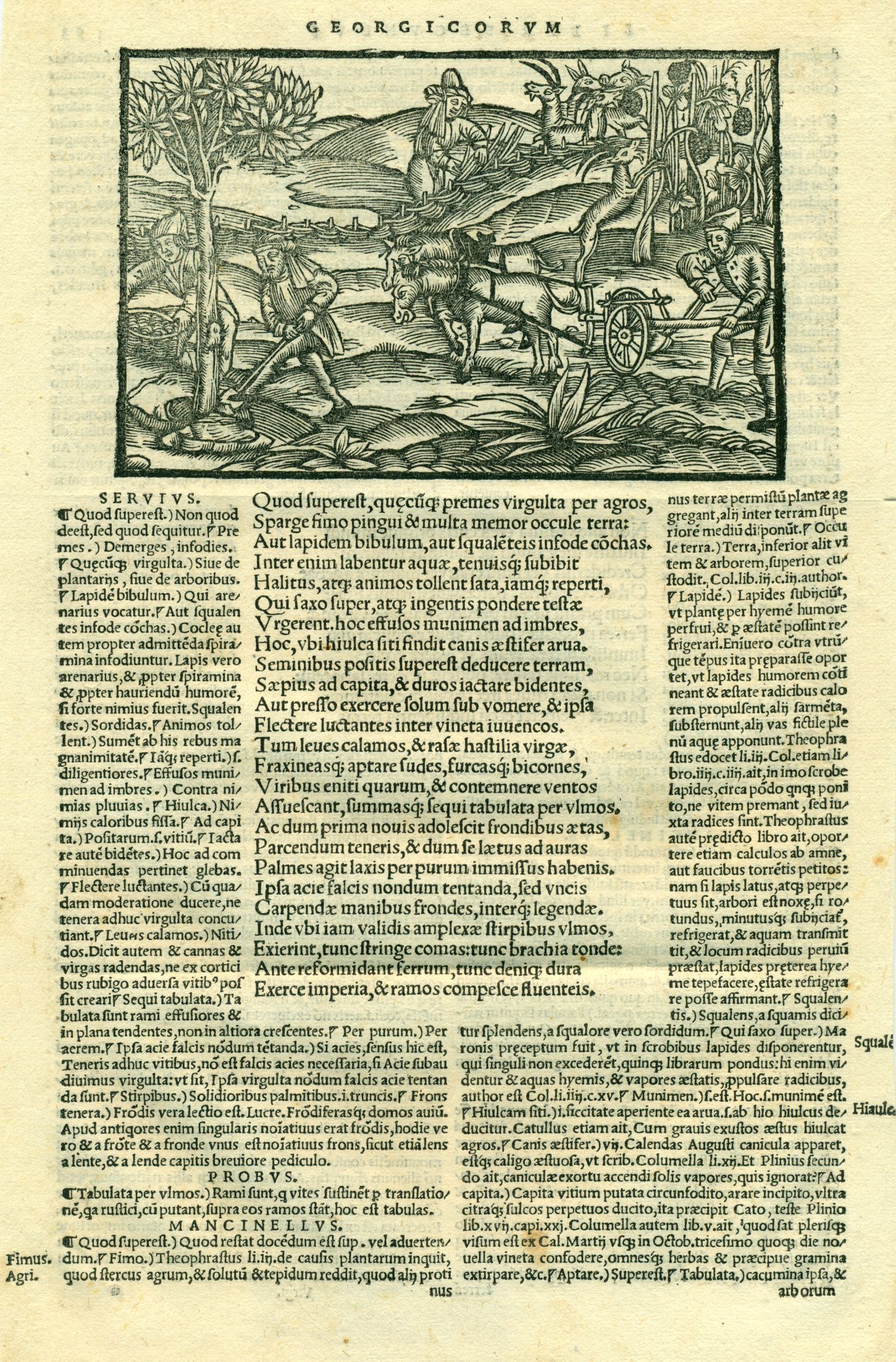Maurus Servius Honoratius on:
[Wikipedia]
[Google]
[Amazon]

 Servius was a late fourth-century and early fifth-century
Servius was a late fourth-century and early fifth-century
''Commentary on the Aeneid of Vergil''
at the Perseus Project in Latin.
''Commentary on the Eclogues of Vergil''
at the Perseus Project in Latin.
* ''Servii grammatici qui feruntur in Vergilii carmina commentarii'', Georius Thilo, Hermannus Hagen (ed.), 3 vol., Lipsiae in aedibus B. G. Teubneri, 1881–1902
vol. 1vol. 2vol. 3 part 1vol. 3 part 2
{{Authority control Grammarians of Latin Virgil Aeneid 4th-century Latin writers Late-Roman-era pagans 5th-century Latin writers

 Servius was a late fourth-century and early fifth-century
Servius was a late fourth-century and early fifth-century grammarian
Grammarian may refer to:
* Alexandrine grammarians, philologists and textual scholars in Hellenistic Alexandria in the 3rd and 2nd centuries BCE
* Biblical grammarians, scholars who study the Bible and the Hebrew language
* Grammarian (Greco-Roman ...
. He earned a contemporary reputation as the most learned man of his generation in Italy
Italy ( it, Italia ), officially the Italian Republic, ) or the Republic of Italy, is a country in Southern Europe. It is located in the middle of the Mediterranean Sea, and its territory largely coincides with the homonymous geographical re ...
; he authored a set of commentaries on the works of Virgil
Publius Vergilius Maro (; traditional dates 15 October 7021 September 19 BC), usually called Virgil or Vergil ( ) in English, was an ancient Roman poet of the Augustan period. He composed three of the most famous poems in Latin literature: t ...
. These works, ''In tria Virgilii Opera Expositio'', constituted the first incunable
In the history of printing, an incunable or incunabulum (plural incunables or incunabula, respectively), is a book, pamphlet, or broadside that was printed in the earliest stages of printing in Europe, up to the year 1500. Incunabula were pr ...
to be printed at Florence
Florence ( ; it, Firenze ) is a city in Central Italy and the capital city of the Tuscany region. It is the most populated city in Tuscany, with 383,083 inhabitants in 2016, and over 1,520,000 in its metropolitan area.Bilancio demografico an ...
, by Bernardo Cennini
Bernardo Cennini (; 1414/5 – c. 1498) was an Italian goldsmith, sculptor and early printer of Florence. As a sculptor he was among the assistants to Lorenzo Ghiberti in the long project producing the second pair of doors—the ''Doors of Paradis ...
, in 1471.
In the ''Saturnalia'' of Macrobius
Macrobius Ambrosius Theodosius, usually referred to as Macrobius (fl. AD 400), was a Roman provincial who lived during the early fifth century, during late antiquity, the period of time corresponding to the Later Roman Empire, and when Latin was ...
, Servius appears as one of the interlocutors; allusions in that work and a letter from Symmachus to Servius indicate that he was not a convert to Christianity.
Commentary on Virgil
The commentary on Virgil ( la, In Vergilii Aeneidem commentarii) survives in two distinct manuscript traditions. The first is a comparatively short commentary, attributed to Servius in the superscription in the manuscripts and by other internal evidence. The second class derive from the 10th and 11th centuries, embed the same text in a much expanded commentary. The copious additions are in contrasting style to the original; none of these manuscripts bears Servius' name, and the commentary is known traditionally as ''Servius auctus'' or ''Servius Danielis'', from Pierre Daniel who first published it in 1600. "The added matter is undoubtedly ancient, dating from a time but little removed from that of Servius, and is founded to a large extent on historical and antiquarian literature which is now lost. The writer is anonymous and probably a Christian",''Encyclopædia Britannica'' 1911: sub "Servius Maurus Honoratus" although one proposed author,Aelius Donatus
Aelius Donatus (; fl. mid-fourth century AD) was a Roman grammarian and teacher of rhetoric.
Works
He was the author of a number of professional works, of which several are extant:
*Ars maior – A commentary on Latin grammar.
* Ars minor – ...
, was a Christian.
A third class of manuscripts, written for the most part in Italy, includes the core text with interpolated scholia
Scholia (singular scholium or scholion, from grc, σχόλιον, "comment, interpretation") are grammatical, critical, or explanatory comments – original or copied from prior commentaries – which are inserted in the margin of th ...
, which demonstrate the continued usefulness of the ''Virgilii Opera Expositio''.
Other works
Besides the Virgilian commentary, other works of Servius are extant: a collection of notes on the grammar (''Ars grammatica'') of Aelius Donatus; a treatise on metrical endings in verse (''De finalibus''); and a tract on the different poetic meters (''De centum metris''). The edition of Georg Thilo and Hermann Hagen (1878–1902), remains the only edition of the whole of Servius' work. Currently in development is the Harvard Servius (''Servianorum in Vergilii Carmina Commentariorum: Editionis Harvardianae''); of the projected five volumes, two have so far appeared: ii (Aeneid 1–2), 1946, and iii (Aeneid 3–5), 1965.References
Sources
* E. K. Rand, "Is Donatus's Commentary on Virgil Lost?" ''Classical Quarterly'' 10 (1916), 158–164. Donatus's authorship of the supplementary material. * "The Manuscripts of the Commentary of Servius Danielis on Virgil", ''Harvard Studies in Classical Philology'' 43 (1932), 77–121; * "The Manuscripts of Servius's Commentary on Virgil", ''Harvard Studies in Classical Philology'' 45 (1934), 157–204. * Casali, Sergio and Fabio Stok (edd.). ''Servio: stratificazioni esegetiche e modelli culturali / Servius: exegetical stratifications and cultural models'' (Bruxelles: Éditions Latomus, 2008) (Collection Latomus, 317).External links
* *''Commentary on the Aeneid of Vergil''
at the Perseus Project in Latin.
''Commentary on the Eclogues of Vergil''
at the Perseus Project in Latin.
* ''Servii grammatici qui feruntur in Vergilii carmina commentarii'', Georius Thilo, Hermannus Hagen (ed.), 3 vol., Lipsiae in aedibus B. G. Teubneri, 1881–1902
vol. 1
{{Authority control Grammarians of Latin Virgil Aeneid 4th-century Latin writers Late-Roman-era pagans 5th-century Latin writers